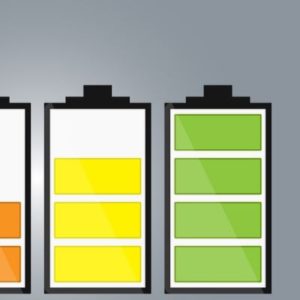The Energy Show: Gigawatt Scale Solar Installations
[

We often talk about smaller solar power systems on homes or commercial buildings. On this week’s Energy Show we are discussing gigawatt scale solar installations. The logic is simple: solar panels are getting cheaper and installation costs are declining. At the same time, utility electric prices keep increasing. When prices go up and costs go down profits can skyrocket – so it’s no surprise that there is a big market for large-scale solar installations. When I started doing PV installations in 2001 the biggest projects were about 5 MW. Now there are several 500 MW installations proceeding in the U.S., … Read More
Nice Headline, Doctor – But That Doesn’t Make It True

By Frank Andorka, Senior Correspondent What Happened:Ah, ya gotta love drive-by hit pieces led by tricky, click-bait headlines, don’t you (you don’t, and you SHOULDN’T)? Vox ran an article (which you no doubt saw, given how many of you clicked on it) that implied somehow battery storage was bad for the electrical grid, headlined “Batteries have a dirty secret.” Then, in the subhead, David Roberts, aka “Dr. Vox,” asserts that the actual deployment of batteries increases carbon emissions. OMG, if true, right? Well, as you probably have already guessed, that’s not what the story says at all. Quelle surprise. SolarWakeup’s … Read More
Turns Out, Silvio Marcacci May Be On To Something (About 320 GW Of Untapped Solar Potential)

By Frank Andorka, Senior Correspondent What Happened:The Interstate Renewable Energy Council has released a report outlining two potential paths to enable greater solar access for renters and multifamily residents, and low-to-moderate income communities. The report, titled Expanding Solar Access: Pathways for Multifamily Housing, suggests shared solar, whether on-site or off-site, is the key. Following on last week’s Forbes magazine article by Silvio Marcacci arguing that there could be 320 GW of untapped solar potential in just these types of applications, the report seems timely. SolarWakeup’s View: Last week, I gave major props to solar support Silvio Marcacci’s article in Forbes … Read More
This is your SolarWakeup for April 30th, 2018
Jumping on a flight to Minneapolis for Midwest Solar Expo. I’ll be interviewing the CEO of a co-op, hope you can join me.
An Opportunity Missed In Michigan. Michigan PSC voted to allow the DTE natural gas plant to proceed, maintaining the status quo. Imaging the opposite decision had been made and the new energy economy would have started to sprout in Michigan. I’m proud of the work that was done by solar advocates to make this an issue, I hope this happens on every sitting plan going forward.
Yes, So What. All new supply chains have their issues and the energy storage industry isn’t much different. All hardware is going to have an inherent carbon cost and one using mined materials is even worse. But to assume that there is a price too high for the value that batteries will provide to the energy space isn’t in play for me right now. Storage will do amazing things especially as we drive the price down.
Definitely Watch This. A couple of time-lapse images of ultra large solar farms in China. Worth a watch.
Can We Discuss ITC Yet? The ITC step downs are on the horizon, already being modeled in solar development and affecting solar plus storage installs. All at the same time where oil and gas will continue to benefit from exploration credits and more importantly the active tax credit rules whereas solar has to play with passive liabilities only. Solar should drop down the tax credit when, and only when, all other energy sources lose their credit as well.
Minnesota. Tomorrow I moderate a discussion with solar leaders about the impact that the 201 and steel tariffs have had on the solar industry. What do you want to hear during this discussion?
News
Opinions:
Have a great day!
Yann
MPSC Issues Most Unsurprising Ruling Ever (And Approves $1 Billion DTE Energy Plant)

By Frank Andorka, Senior Correspondent What Happened:The Michigan Public Service Commission (MPSC), in a decision that surprised no one, awarded DTE Energy the right to build its $1 billion boondoggle natural gas plant. The commission appears to have ignored, you know, the evidence that showed renewable energy – specifically solar – would provide a much better bang for ratepayers’ bucks than this natural gas plant. The action comes as a blow to solar advocates across the country, who were watching this case to see if the aggressive tactics would stop the plant. Proposed natural gas plants are increasingly being denied … Read More
This is your SolarWakeup for April 27th, 2018
Eyes Wide Open. This is bigger than just Alabama. This is Michigan, Connecticut, and more. Solar net metering continues to be under attack and it’s threatening thousands of jobs and small businesses. Keep in mind that penetration is essentially negligible and provides more value to the grid than it costs. If we want major adoption of solar across the Country, solar needs to have a fair way to operate with market certainty.
Buildings Stay Open Longer Than Businesses. I agree that commercial solar will be majority 3rd party owned. It’s not because business owners don’t have access to tax equity, it has everything to do with the following. Ask a CEO if the business will be around 25 years from now, and they will be absolutely certain it will be. Ask that same CEO if they will still be in that building 25 years from now and a lot of hesitation comes across their face. Solar is a long term solution to power a building, not just the business within it and that is why the building itself is what should be underwritten in the transaction.
Pruitt Keeps Going. Here’s an unpopular opinion, I hope Pruitt sticks around. Yes, he is doing crazy stuff at the EPA and fighting science at every turn. But his non-political actions are keeping him on the front page and showing off his regulatory dismantling, to the dismay of the American people. If Pruitt goes, then so does the limelight. Who do you think will replace him? Do you think that person would do anything different on the policy front?
Press Releases Aren’t Under Oath. It may come as a shock to you but sometimes press releases aren’t everything they seem to be. I think it’s great that SunPower bought SolarWorld and First Solar is building another factory in Ohio. If you think that 201 is the reason that both of those events happened, then you need to stop trusting every press release. 201 is only a 4 year event and First Solar was exempt from it anyways. They could have built that factory anywhere in the world and doing so in Ohio had nothing to do with 201. On the other side, more complicated, is SunPower buying SolarWorld USA. For our view on why we think this happened, read here.
Enjoy Your Weekend. Will I see you in Minneapolis next week?
News
Opinions:
Have a great day!
Yann
Hawaii Revolutionizes Consumer-Utility Relationship With New Law

By Frank Andorka, Senior Correspondent What Happened: Hawaii has rebalanced the relationship between utilities and their customers with a new law tying rate increases to performance data. According to Hawaii Public Radio, “The Hawaii Ratepayer Protection Act will require the Public Utilities Commission, the PUC, to develop incentives for local electric companies to modernize and manage costs.’ The law takes effect July 1st. The PUC will then be required to create an incentive framework by January 1, 2020. SolarWakeup’s View: To call Hawaii’s solar situation “complicated” would be like calling World War II a “kefuffle.” Ever since October 2015, when … Read More
Does Chapter 11 Shelter Schletter From Employee Wrath?

By Frank Andorka, Senior Correspondent What Happened: Schletter’s bankruptcy just got more interesting to me, based on some public information a friend of mine shared with me. Did you know that Schletter had been sued by its employees in the Western District of North Carolina – the same one in which they have field bankruptcy – after one of their employees fell prey to a W-2 phishing scam that caused the sharing of all the employees’ private information with some identity thieves? Did you also know that in late March (full document below) the judge dismissed Schletter’s attempts to dismiss … Read More
This is your SolarWakeup for April 26th, 2018
The Official Schletter Update, Chapter 11. I get zero pleasure of writing these notes. I’ve been there myself, figuring out how to come up with a hail mary, worried about what to say to the team. You want them to stay focused on the task, not worry about their jobs, in the back of your mind worried that you may have to let them go. Solar is a cruel business, margins are tight but the gold mine remains unbelievably full and that is what keeps us going. Schletter has filed for chapter 11 protection in the US as it seeks a buyer for the global business. A spokesperson for Schletter says that they have interest from industry and financial investors alike. The cause for the protection is a bet into securing a pipeline which seems to imply that Schletter was doing project development to secure the sale without getting their margins crushed. We’ll Monday morning quarterback that decision and execution another day. In the meantime, let’s find these good folks new jobs so they can make a living in solar.
Fixing The Utility Monopoly. If there is ever a utility policy that reads as good as it sounds it is the legislation in Hawaii. Instead of getting paid to build stuff, regardless of how much value it creates, Hawaii will align utility revenues to consumer metrics including metrics in solar and storage. Utilities in the traditional rate base make money when things break, like after a hurricane in Florida. Replacing wood poles is a great business for those ‘investors’ when the consumer is the insurance and fuel hedge. Maybe we should consider Hawaii’s success as we craft new ways forward for Puerto Rico. On the other hand, what a difference compared to a year ago when NextEra looked like they were going to be the Hawaii electric company owner.
A Case Study For Buildings. RMI and energy consultants are posting about a project that brought a Colorado building closer to net zero. The interesting twist on this is that not only was the project feasible from a technical standpoint, it was also financed using commercial PACE assessments. As I wrote yesterday and we covered earlier, financing is not only a function of the interest rate, it is also a function of term length. Click above to see what rates and terms are available for project capital on solar projects.
Je Suis Désolé, Monsieur Trump. Macron got the last word in his visit to DC with his message to the joint session of Congress. Maybe it was the dandruff brushoff or something else that got Macron to provide a solid rebuke to Trump and Congress about climate change and transforming our economies to meet the challenge. Macron is not an ideologue on the environmental issue, he’s a financier that understands that productivity means creating and growing the sectors of the economy that mean a better future. It doesn’t hurt that the bipartisan support on this issue looks a whole lot better than coal and nuclear. This message was brought to you by the most nuclear powered nation on earth, France.
Midwest Solar Expo. Are you joining me in Minneapolis next week? I’ll be moderating a session on 201 tariffs with some great solar leaders, including longtime SolarWakeup friend, Tony Clifford, as well as hosting SolarWakeup Live! at MWSE with the CEO of Connexus Energy to talk about how a rural cooperative implements solar and storage in the Midwest. Not to late to jump on a plane and join us.
News
Opinions:
Have a great day!
Yann
Michigan Utility Under Fire For Alleged PURPA Violations

By Frank Andorka, Senior Correspondent What Happened:DTE Energy is in the news again, and it is yet again not for a good reason. Greenwood Solar has filed a complaint against the utility alleging that it is not negotiating to buy their electricity in good faith as is required under the Public Utility Regulatory Policies Act of 1978. Under PURPA, utilities are legally required to buy power from independent power producers (IPP) if it is below their cost of generation from other sources, also known as “avoided costs”. Congress passed PURPA at the height of the 1978-1979 oil crisis, when Western … Read More

